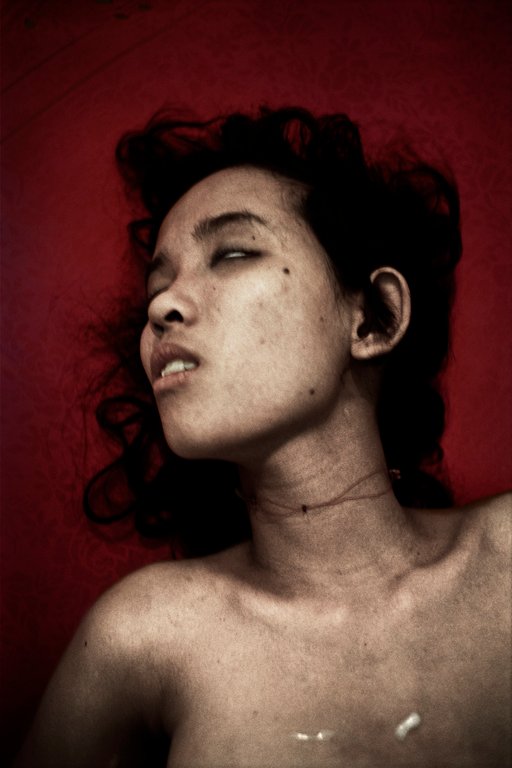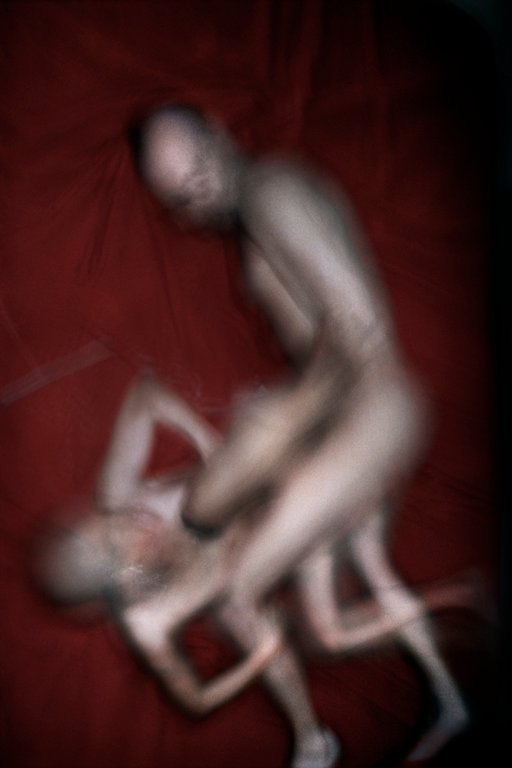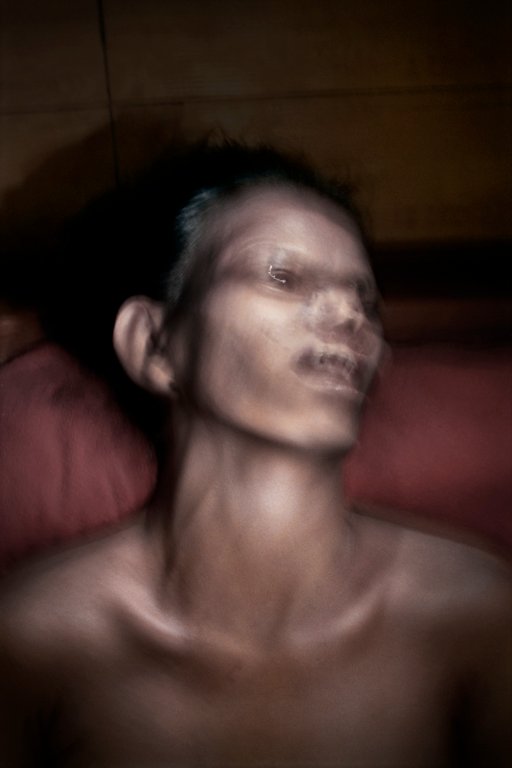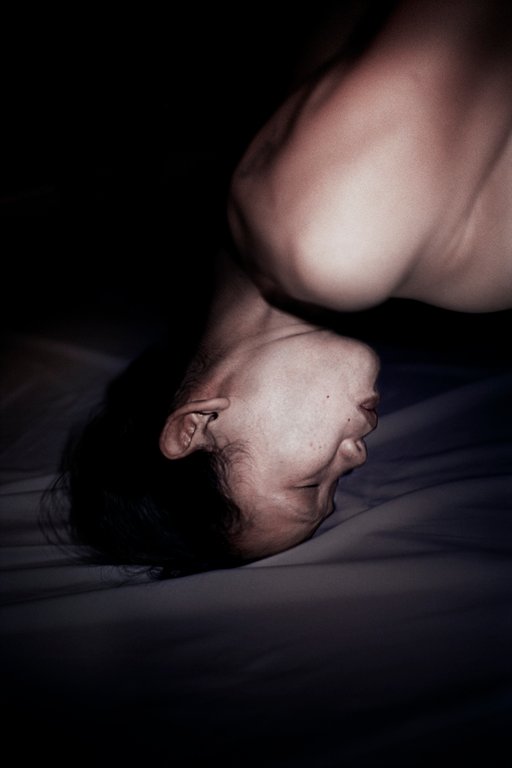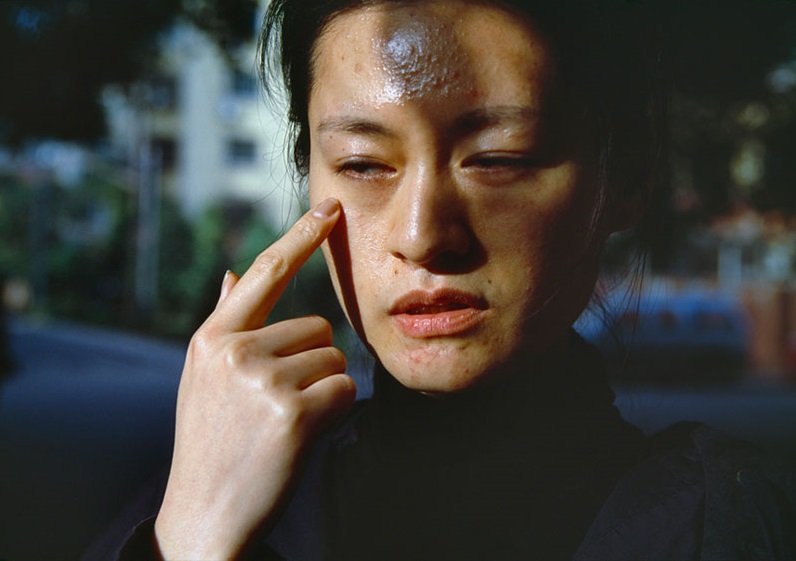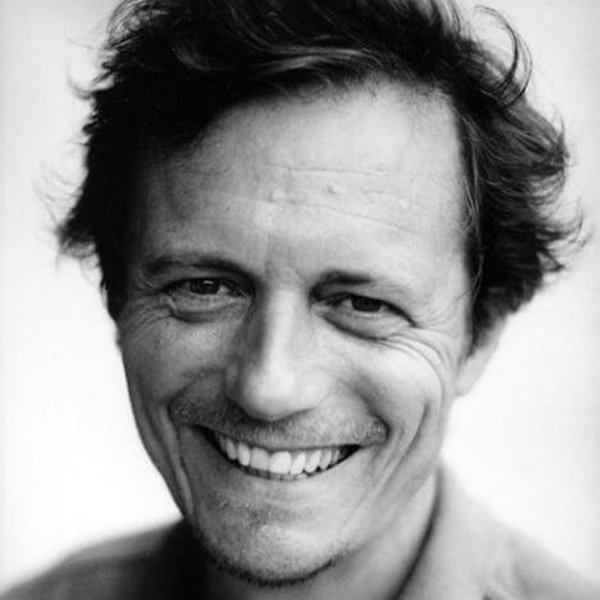THIS STORY CONTAINS EXPLICIT CONTENT
France –
Emaho in conversation with Antoine D’Agata, continued –
Manik: Any moment of regret?
Antoine: No I mean because of the years, as you go further and further, in following my logic involves taking more risks to be with more people, share with more people. You have to realise the bad things, the very bad things, even lethal things. You come to a point where you become very self destructive. And you know it. But its part of the condition to be as coherent, as honest as possible. So I did some crazy things which some days, I regret but most days I don’t. Today I don’t. But some dark days, some melancholy, nostalgic days on what things could have been like if I’d been a bit less demanding towards my own self.
Manik: Tell me about your book Vortex (A book of self portraits). What made you personally do it and what is it about?
Antoine:Well, its a very little book. And since many many pictures came which could complete this book. I think it came…the day I realised that the self portraits weren’t just a way to..um.. because I had not being doing too many self portraits. I mean I do appear in my pictures more and more. I think its when I realised that this presence, this physical presence in the photographic frame is not just an accident and I knew it was not out of vanity or out of self absorbed sensibility or narcissism. But I never knew until then exactly what or why I wanted to be in the pictures. And I think when I made Vortex it was because at that point I realised that being inside was more symbolic and more efficient a way of making my point about photography not being a way to look at the world but being a way of experimenting the world. And that’s why this book became so important and because, to become a character of my own images had a very deep ground, you know?
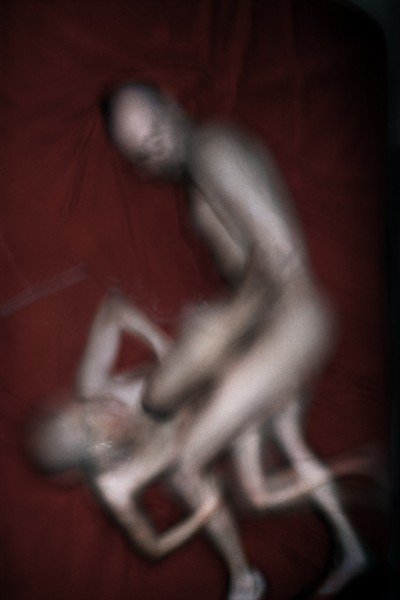
Phnom Penh, 2008
Manik:How important is it for you to be part of your images?
Antoine: It is more and more. And preferably, in the last two years I haven’t taken some pictures myself because I was in the frame. Haha. And I couldn’t be there at the same time. So this is where I’m asking..when I’m in the night world, the underworld, I ask people to help me make the pictures because so many times I have to choose in between being outside and inside and I don’t want to be outside. I prefer a bad photo of documenting my real interpretation to the world of a good photo than looking like a voyeur or useless witness.
Manik: Hmm, hmm.
Antoine: And that’s why I switched over and…
Manik: You went over.
Antoine: And became a part of and took complete character of my images.
Manik: Which is very interesting in a very different way if you see.
Antoine: Yes but because again photography is about living the world in a more intense way. About living our life in the most intense way. Do as much as we can do. As human beings, what else can we do? I mean we cant solve anything, we cant answer anything, the most we can do is to keep trying and to keep pushing and to keep provoking new
Manik: Phases of life and being part of it?
Antoine: Yeah and reaching out further, you know?

Phnom Penh, 2010
Manik: Now that you are a part of Magnum, can you share one of your fond memories with the older generation of Magnum like a funny moment or interesting moment or any conversation.
Antoine: Hmm. The ones I enjoy listening to are the very old ones, the very older generation..
Manik: Like who?
Antoine: Which is people like Koudelka, like Rene Burri, like you know, I mean the ones who when photography was a very privileged caste which could travel the world and they could photograph be photographing different parts of the world in a day. They had this very privileged access to the world. And of course they have amazing, rich, wonderful, intense lives, little bit of adventure, but this has been for a long time. And the rest of the story of Magnum, the same way the rest of the documenting of photography – a lot of compromises, a lot of doing business and doing commercial work to survive. So when I came to Magnum, I had no desire of sharing any of this. So my address with Magnum was a sort of ideological battle where I can make my point and not as a family or a club of friends. Its really a battle field for me.

2009
Manik: Ohh! Battle-field? Where lies the conflict?
Antoine: Battle-field because of the misconceptions of the photography inside Magnum and outside Magnum are common and that perspective is very different. It is the opposite of what people think in documenting photography. So to be inside Magnum because of its long history, tradition..
[pullquote_right]“I try to establish a state of nomadic worlds, partial and personal, systematic and instinctual, of physical spaces and emotions where I am fully an actor. I avoid defining beforehand, what I am about to photograph. The shots are taken randomly, according to chance meetings and circumstances. The choices made, considering all the possibilities, are subconscious. But the obsessions remain constant: the streets, fear, obscurity, and the sexual act…. Not to mention perhaps, in the end, the simple desire to exist.” – Antoine D’agata [/pullquote_right]
Manik: Because also of the eliteness of photography..
Antoine: Yes, because it is a symbol of you know..for me it is a perfect battlefield for destroying whatever misconceptions exist in photography. And making a point. They would tell me I don’t belong to Magnum.. I think I don’t care about belonging to Magnum. I mean I care about putting Magnum and photography on the right track.
Manik: Okay, from your perspective?
Antoine: Yes, which is a good one.Haha!
Manik: Yes, which is a good one!Haha! Have you ever thought of producing for Magnum with their perspective? Or has it always been your perspective? Has being part of Magnum helped you in any way?
Antoine: No, no. I mean there have been a couple of times where Magnum had some good assignments which fit..
Manik: Your Genre.
Antoine: Which fit my research and even if outside my usual field of experimentation but sometimes we need. Like 5-6 years ago, I needed…I like to take risks and confront my beliefs and reality of what I live in so I did some war photography. I did some assignments where I was willing to experiment and see what would come out of it. But basically we are in non working relationship. Which means they have nothing to offer me and uh what I do scares them.So.
Manik: So. Has Magnum been supportive for you or not?
Antoine: No I think it has been damaging on some level like financially. It is very hard for me to make a living because I don’t live in Paris, I’ve no fixed base. So I cannot and don’t want to capitalize on my own work so I don’t own prints, I don’t keep prints. I’ve no place to keep prints. I have nothing to sell apart from the few prints I have so my economy is very fragile. And being in Magnum, has made things worse because it has kept me in this kind of active relationship where nothings happening. And keeps me away from finding other ways of earning. But again, for me this is not priority. Priority for me is to photograph and just make enough money to keep me going good enough.
Manik: Okay.
Manik: A lot of people have asked about you being in the unconscious state in a lot of things. I will just ask you define the meaning of “unconscious” from your side in just one word.
Antoine: Umm. Is out of control just one word?
Manik: Yes!

Vilnius, 2004
Manik: And how did you plan to carry out the exhibition Anticorps in terms of the sequence of photographs?
Antoine: Oh this exhibition will go to Paris in January, it’ll be very very different from the one in June. It’ll be different. Video will become part of it, emptiness will become part of it, sounds will become part of it, words will become part of it
Manik: So it’s a different sequence of photographs.
Antoine: Its using exactly the same frames we had for the previous show but using a lot of posters, and using some images from a video I’m working on now. I’m using a lot of voices of girls, I’ve been recording with very little money to make more meaningful and complete object.
Manik: What is the metamorphic meaning of the day and the night in terms of categorizing your work?
Antoine: Yeah, night is my world. Night for me is the real world where it is difficult but feelings are true and real and intense. And day is the real world to so many people. To me it is a world so full of artifice and compromises, long time ago it became the fake world. So to me, I think I have a different perspective than most people. The day world is really one of illusion and disillusion and of deception. And the whole world of night is one where things come to surface and the raw and dark energy of life is taking over the lies of the day.
Manik: Okay.
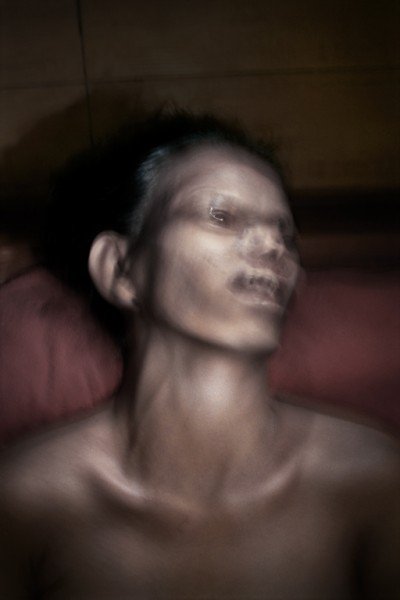
Phnom Penh, 2009
Manik: So where would you place your personal projects – reality or fiction?
Antoine: Oh Reality! Completely. Oh Reality! Completely! I think there has been no space for fiction in my life, but I still have a strong relationship to fiction in terms of not putting a limit on my own life but on always thinking of my own life as a novel, a still unfinished novel that I have to write. And writing my destiny with no limits and after, accepting the fact that it’s my job to my own scenario. In this way yes, I do think to each one of us is a fiction which can be written. We should put no limits to our imagination to what we want to experiment in life. And after all… you live up to the scenario you are writing and this is why in my portraits, in my pictures, I see my own character with somebody who can survive anything, can go anywhere. And have to deal with the fact that I have to go for it, and have to face it.
Manik: And you’ve been doing a lot of workshops and the other day you said you’ve taught more than a 1000 students till now. So you always wanted to share your education with aspiring photographers? Was it something you really liked?
Antoine: No it was something I really enjoyed, it was by choice. Its because I always try to do as little compromise in my ways of surviving in the photographic world. And to teach in workshops was always less painful a more beautiful experience than to work for a magazine. And I always opted for this option which allowed me to meet new people, travel around the world and help me to be with my ongoing projects instead of making much more money with assignments which would sometimes kill my perspective, my feelings, my photography. The workshop is a privileged space where everybody questions themselves and I do enjoy helping people question themselves. It sometimes forces me to keep a constant critical look on my own practice. So it is more like being paid to think instead of being paid to obey.
Manik: Do young photographers who attend your workshop get influenced by the work you produce?
Antoine: Oh no, no. I mean you can ask any of my students and I do always do my very best to discourage them. Even the ones who sometimes seem tempted by me or by some wrong idea of my work is about, I do always my best to keep them on track. My work with them is to ask them to be themselves and invent their own photography and not to follow any way which..

Groningen, 2004
Manik: But I think if they are honest about what they are doing, do you think it is right or wrong if they try and follow your path?
Antoine: No I think my path is trying to be honest and very personal and not try to create a product which fits in the market. But to come with someones own voice and not using photography in a purely visual way but as a way to confront the outside world and to confront each one’s existence. And in this way, yes, doing what I do. But if you speak in terms of night, in terms of excess, or something then I think I don’t wish anybody to experiment this. I mean this is my own..

From ‘Position(s)’
Manik: Your own thought process. Like you would not encourage someone to follow your path but if they are honest about their own personal ways..
Antoine: Of course, of course. Yes. And some of them are photojournalists, some are conceptual, some are various street documentary photographers, and some are not photographers but use photography as a way to explore their own lives and emotions and I’ve no limits. I’m very eager to help them use photography the way they want. But I try to help them get some definity about what photography is and what the truth is which is not what you read in photomagazines and what you hear about in festivals.
Manik: Has educating photographers and teaching become part of your life now?
Antoine: It has become but again its not, in a way, it’s a compromise. Even if you make as little compromise, you always have to make certain choices and to teach is not a pure choice, its what I have to do to keep going. I mean I think if I could give up all compromise I would stop photographing. I would just go back to my own real life and just experiment and discover by myself without any ambition or desire to share it photographically. I think years ago I decided I didn’t want to just experiment, that sharing what I do in some ways makes sense because the sense of it is so political and so universal. Its not about my own destiny and my self it is about making a choice and trying to make a statement of the life I live and try to change things.
Manik: How do you confront yourself? That there are certain things that you have done that you shouldn’t have done to your own self?
Antoine: Yeah, but I mean. Of course nobody’s perfect but if I think of all the wrong things I did, I always leave them to myself, never to anybody else. I’ve always tried and what I believe in some way to be good. I’ve nothing to be ashamed of. Outside the photographic world, like in the night world, people like me not for what I do like photography but for what I am. So the relationships and trust we build is hard to achieve. By making the choice I make, I’m taking away from them some sense of family..
Manik: How difficult is that?
Antoine: This can be difficult because they make a choice and I’m taking something from them which they expect to be allowed to have and for this I don’t feel good. In confronting myself, I always try to do the best out of my job, out of my being. And I try my best to make it easy for myself but these are the people I share my life with and have nothing to be ashamed of.
Manik: Okay.
Manik: If you’re comfortable, can you tell us about your family? Like how things are and who is Antoine when he’s back with the family and how does he spend time with the family?
Antoine: I spend very little time. I have kids, four girls, and we have very little time together. Because when I travel and I need to go deep down into my own world, I have to stay away from them and break communication with them and I don’t really communicate on telephone or internet or anything. But I did struggle a lot because we are very close to each other even though we live in different cities. I hope they don’t need me too much and can do without me. But when we are together we are very very close and as they grow old they go through some critical stages and become critical of me, but so far it always comes back to a close bonding.

Manik: When you’re back with the family, no matter how little time you have, what do you do? How do you play your role of a family man?
Antoine: I think because we have so little time together we don’t do anything!
Manik: And that’s the best part!
Antoine: Yes! We can be in one place or we can travel. No special plans, the most special thing is we spend time together because we have so little of it together. So most of the time we get bored but together.
Manik: Do you take photographs of your family?
Antoine: Never, never.
Manik: Never?
Antoine: Because I think it would be contaminating the time we have together. And even once in a while I try, they keep me away from it probably because they see it as photography coming to take away the time we have together so they protect themselves, I protect them and we keep photography out of it.
Manik: And what are the projects that you are working on these days?
Antoine: Right now, the exhibition, a book on Anticorps in Paris in January and I’m finishing this video which would be made out of recordings from 22 girls around the world over the last 2 years. Depending wherever I was because I had no money for this project so its not like I travelled for it. Wherever I was, I was doing this video. I’m finishing it now. And all these projects, the book, the exhibition and the video will be done by January and I think we willcome to the end of an important work. Right now I’m so exhausted and tired. Especially after these last few days we’ve spent in Cambodia, I am exhausted and empty and tired so I’ve decided to wait until the end of January when this will be finished, to start thinking about the future.

Tokyo, 2006
Manik: So do you have a strong bonding with the girls you photograph? Do you stay in touch with them after your project is done?
Antoine: All kinds of situations, some of them I never see again, some of them when I come back to a country, I see and I’ve known for years and I see again and again. Some I think I will never see again and end up seeing by accident. Like I came here a year ago and this year, 3 of the girls I was in some ways with died. And one is running away and hiding from the police and one is in jail… I mean its so many… the link is so fragile so we never rely on it, we never… time is not part of the deal. The deal is the present, the trust we have and what they give me which is always much more than what I give them, which is respect and a sense of security and that’s the contract we have.
Manik: And how close is Cambodia to you as a place because you’ve alsobeen part of a film project ‘The Cambodian Room’
Antoine: A few journalists documented a couple of days of my life years ago. But Cambodia became a place I’m trying to stay away from because I continue experimenting with drugs, I almost died here. Haha! I can come back to Cambodia because it’s such an extreme country. There are guys here with beautiful lawns and beautiful smiles everywhere but it’s a very tough and rough place. It gave me the opportunity to go very far in my own quest especially since the last few months I probably made some of the biggest mistakes of my life. Haha! So for me it’s a very special place, and I do carry this country in my heart. It’s been very amazing and very damaging to me sometimes.
Manik: And the last question, do you attend a lot of festivals? What is your relation with the Angkor Photo Festival?
Antoine: No, I don’t like festivals in general but I’ve been coming here to Angkor, I was one of the people who first thought about creating the festival, I was part of the initial group of photographers and have been teaching here every year since 7 years now. To me its always been amazing to have this variety of young people coming from 15 different countries who come and share and make effort to belong. And it’s a very very beautiful experience. I cant say much on the festival because I don’t see much of it because I’m so involved in the process of the workshop. But to me its always magic to see young faces and I try to give them a bit of fervour and strength, and reflection. I try to do less workshops these days but I keep coming here to give my time because its always beautiful.
Photographs by – Antoine D’agata
Photography Interviewed by – Manik Katyal
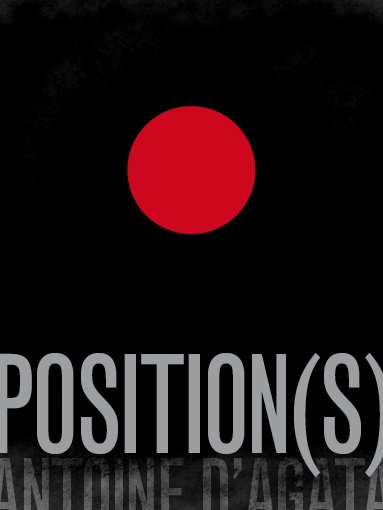
Positions – Antoine d’Agata
Reviewed by Colin Fernandes
Antoine d’Agata never does things by halves. In ‘Positions’, where his work goes beyond mere titillation and voyages instead into the discovery of existence itself, d’Agata says that ‘by transgressing the border that usually separates the photographer from the subject, he’s become the object of his pictures.’
A visceral collection of images, Positions is divided into 26 categories such as Addiction, Fractures, Underworld, She and Letterton; each outlining a stark corner of life. The high contrast images have accompanying quotes from artists, philosophers and even the Marquis de Sade! The book also includes writing from previous interviews and conversations, diary entries and email correspondence between Antoine and his subjects. For those familiar with d’Agata’s blurry way of merging work and the day-to-day, the text is a fascinating commentary on his thoughts on photography and life; the way the two intersect and interact. Interestingly the size of the book has been cut to be exactly the size of d’Agata’s hand! Talk about having a grip on things!
